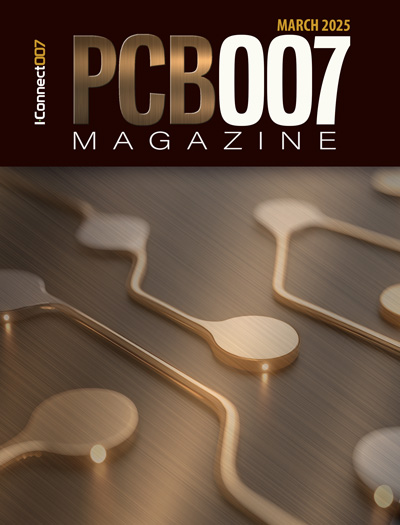-

- News
- Books
Featured Books
- pcb007 Magazine
Latest Issues
Current Issue
Voices of the Industry
We take the pulse of the PCB industry by sharing insights from leading fabricators and suppliers in this month's issue. We've gathered their thoughts on the new U.S. administration, spending, the war in Ukraine, and their most pressing needs. It’s an eye-opening and enlightening look behind the curtain.

The Essential Guide to Surface Finishes
We go back to basics this month with a recount of a little history, and look forward to addressing the many challenges that high density, high frequency, adhesion, SI, and corrosion concerns for harsh environments bring to the fore. We compare and contrast surface finishes by type and application, take a hard look at the many iterations of gold plating, and address palladium as a surface finish.

It's Show Time!
In this month’s issue of PCB007 Magazine we reimagine the possibilities featuring stories all about IPC APEX EXPO 2025—covering what to look forward to, and what you don’t want to miss.
- Articles
- Columns
Search Console
- Links
- Media kit
||| MENU - pcb007 Magazine
Rex Rozario, Part 3: The Future Beckons
March 16, 2016 | Barry Matties, I-Connect007Estimated reading time: 14 minutes
Matties: Let's just come back to the China question about the marketplace and the economy over there. Obviously it's down, with a lot of capacity there. What do you see? Are you optimistic?
Rozario: I think I'm a born optimist. I've been expanding factories in the worst recessions. You have to believe in what you are doing. In electronics and especially when you're manufacturing a PCB, there's always a requirement. If you can make it better and more sophisticated, then of course you survive. Obviously, the growth we saw very quickly has stabilized a little bit now. Having said that, they are now developing the local market and selling the products they're not selling abroad. Before that point they were very cautious not to make the locals get too used to their expensive goods.
From that point we have not seen a big difference. Certainly it has slowed down a bit, but not to the extent that we have to be concerned. We are still looking at our next expansion program. When you visited the last time, we said we were ready, waiting to go, but we are waiting to see signs of a slight changeover and then we'll do that.
Matties: Do you have an estimate of time as to when you think that change is going to happen and we'll start seeing the strength coming back to China?
Rozario: It's a difficult question for anyone to answer, because even China is looking for low-cost production areas. Recently they have been looking at India and the Indian government has made a big changeover. They have visited Japan and groups of people over there and they're trying to do what the Chinese did—probably at a cost saving, because I know the labor cost of manufacturing is much cheaper there than China.
If you look at labor in China now, compared to when we first went there, you wouldn't believe it, Barry. Our engineers there are getting more than what we pay in Europe for the top guys.
When we looked at China initially, everything was starting in the East, and any Chinese person would say that you could go on for 50 years and when it becomes expensive you move on to the next stage and you keep going to the West.
Matties: Into Russia, yes.
Rozario: That, in practice, hasn't really happened, because some of these people, once they get a bit of money, don't live in China anymore. They move, and if you go around the world you'll find that most countries have a Chinese population. If you look at Exeter in the inner city, 25% of the foreign students are Chinese. They have about 850 Chinese living over here.
Then there's a shortage and people don't move to the next area because everyone has moved elsewhere. That’s slowed down, but people are still moving slowly. There is an area that you can move for cheaper labor and whatever, but if you can automate, then it doesn't matter. That's the story we should be selling to everybody else in manufacturing. It doesn't matter if it's PCBs or something else.
Matties: I see automation as very key in China and mass volume production, but in these high mix/low volume shops, I question the value of automation, because if you go after automation then you're of the mentality to just mechanize what you already have in place. For many in America, for example, doing $12 million in sales, they have to think carefully as any smart business does, where they're going to invest their money.
Shouldn't we be looking at removing process steps? That supplants the need for a lot of automation in between the steps to begin with. Like when we talk about LDI, as a simple example, because how many steps did that remove from the manufacturing process?
Rozario: Oh gosh, not to mention the accuracy and the stability.
Matties: The accuracy, and then also the cycle time and the real estate required. No matter how automated the traditional process is, you may still have 10 or 11 steps versus one or two with new technology. My thinking is the alternative and perhaps wiser strategy is focusing on eliminating the steps in manufacturing rather than automating the steps that are in place. What do you think of that concept?
Rozario: Yes, everybody can't just say they're going to automate. A smaller company will find it very difficult. You can cut the staff down, but I've been to a setup where they were going to automate prototypes and I could see a guy feeding a machine, and then he had to run around to wait for it to come to the other side. That company doesn't need that automation. They could do it in a smaller way, but if you're doing volume then you have to.
Automation means that you don't even feed the machine, like you see our feeder does all that. It just picks it up. If you tried to use labor in between automation, that process is not that easy to maintain. So I think it's a combination of things, and I think this was a problem with the small board shops.
Matties: Where do you think the priority should be? Do you think the priority should be in reducing process steps? If I have a process that's working and I'm getting acceptable yields and all I want to do is automate it, that's easy to do. In fact, I don't know why many companies haven't already done that.
Rozario: Sometimes that’s driven by a customer who has required us to get something because he's read somewhere that this is what he needs. Then we rush out and get one and tell the customer, “Yes we got one, now what about the ordering.” The small guy who doesn’t have the finances cannot do that. I've been to companies around the world and even now some are still doing the same process they had 20 years ago with the same equipment and they're using their skill to produce the job, but that is short-lived, because eventually they find that because they haven't got the test equipment to test the finished product. Those companies are now gradually disappearing.
It's like here in England, they say something like 30 pubs close every month, more or less, and it's a sign of the times. The larger ones who can buy in, like Weatherspoon’s, who has more than a thousand pubs, can purchase any stocks from any supplier and with a week’s life duration can dispense of it and make a lot of profit, but a small guy cannot afford that.
Matties: They don't have the economy of scale.
Rozario: That's the difference. Sometimes it all depends on your resources.
Matties: When you look at an LDI system today, it costs hundreds of thousands of dollars.
Rozario: Yeah, we're still looking at ink jet and that could eventually take over LDI completely, which makes it much cheaper to acquire and so forth, but that's still in the development stages.
Matties: For a shop that's doing $12 million a year, buying a million dollar piece of equipment might be their entire budget.
Rozario: I'm sure if you did the survey, you'll still find that only a limited number of shops even have one LDI.
Matties: That's right. When I look at the million dollars versus all the automation I would have to have in the traditional process, that million dollars would be a smart bet, I think.
Rozario: Yep, that's it, but you won’t make that return for a very long time as a small company.
Matties: That's the problem.
In the final installment, Rozario walks us through a couple of other personal incarnations, including that of successful restaurateur, marina owner, and more.
Page 2 of 2Suggested Items
Hunting for Clues: Feng Xue Solving Circuit Board 'Crimes' With AOI Standard
05/08/2025 | Linda Stepanich, IPCWhen residents in sleepy English villages needed a top-tier detective to solve a murder, they called on Belgian super-sleuth Hercule Poirot, author Agatha Christie’s fictional detective famous for using his “little grey cells” to solve crimes. In the same way, IPC standards development committees, when creating a standard to detect defects in circuit boards using Automated Optical Inspection (AOI), call on IPC A-Team, Hercule.
IPC Strengthens Global Focus with Promotion of Sanjay Huprikar to Chief Global Officer
05/08/2025 | IPCIPC, the global electronics association, announces the promotion of Sanjay Huprikar to chief global officer. This newly created position reflects the association’s forward-looking strategy and industry needs to strengthen the electronics supply chain.
Navigating Global Manufacturing in an Era of Uncertainty
05/07/2025 | Philip Stoten, ScoopThe EMS industry faces unprecedented challenges as global trade tensions rise and tariff announcements create market uncertainty. In an overview of IPC Europe’s podcast, MADE IN EUROPE, industry experts from GPV and Zollner examine how these developments impact our businesses and customers, and what strategies will prevail in this new landscape.
Nick Koop Launches IPC Flex Design Class
05/06/2025 | Andy Shaughnessy, Design007 MagazineNick Koop is director of flex technology for TTM Technologies, and he’s been a staple of IPC’s flex committees for decades. He’s also a longtime flex design instructor, and he’s about to debut a new IPC class, Flex and Rigid-Flex Design for Manufacturability, which will run May 12–21. In this interview, Nick tells us about this new class and what attendees can expect to learn.
The Government Circuit: Trump’s Trade War Disrupts the Electronics Ecosystem
05/06/2025 | Chris Mitchell -- Column: The Government CircuitThere is certainly no shortage of work to be done in the IPC Government Relations department, as the U.S. waged a tariff campaign on practically every industrial country in the world and several countries embarked on high-tech initiatives with a mix of approaches to the crucial foundations of electronics manufacturing. Indeed, the breadth and speed of U.S. President Donald Trump’s tariff campaign continues to be a serious challenge for our industry.


